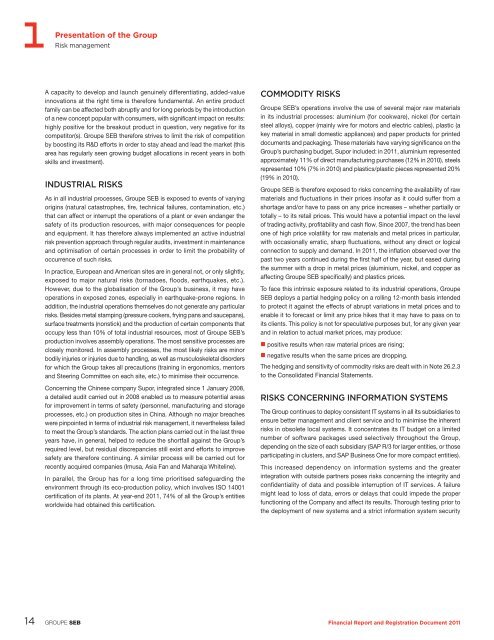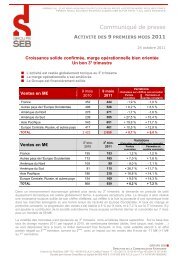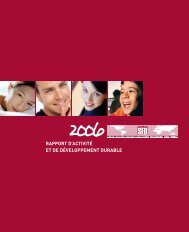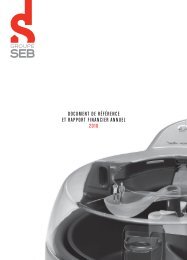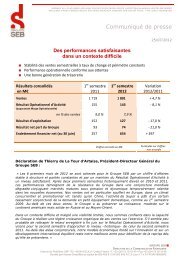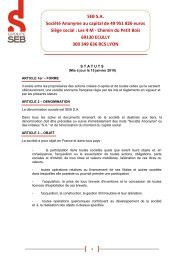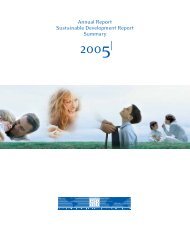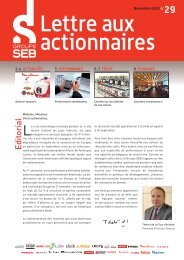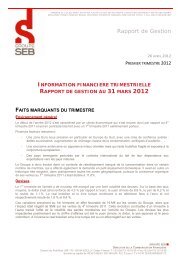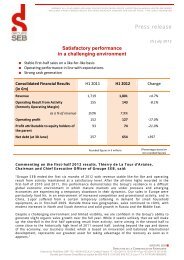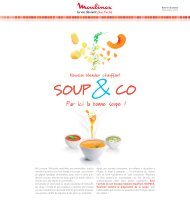financial report and registration document 2011 - Groupe SEB
financial report and registration document 2011 - Groupe SEB
financial report and registration document 2011 - Groupe SEB
You also want an ePaper? Increase the reach of your titles
YUMPU automatically turns print PDFs into web optimized ePapers that Google loves.
1 Risk<br />
Presentation of the Group<br />
management<br />
A capacity to develop <strong>and</strong> launch genuinely differentiating, added-value<br />
innovations at the right time is therefore fundamental. An entire product<br />
family can be affected both abruptly <strong>and</strong> for long periods by the introduction<br />
of a new concept popular with consumers, with signifi cant impact on results:<br />
highly positive for the breakout product in question, very negative for its<br />
competitor(s). <strong>Groupe</strong> <strong>SEB</strong> therefore strives to limit the risk of competition<br />
by boosting its R&D efforts in order to stay ahead <strong>and</strong> lead the market (this<br />
area has regularly seen growing budget allocations in recent years in both<br />
skills <strong>and</strong> investment).<br />
INDUSTRIAL RISKS<br />
As in all industrial processes, <strong>Groupe</strong> <strong>SEB</strong> is exposed to events of varying<br />
origins (natural catastrophes, fi re, technical failures, contamination, etc.)<br />
that can affect or interrupt the operations of a plant or even endanger the<br />
safety of its production resources, with major consequences for people<br />
<strong>and</strong> equipment. It has therefore always implemented an active industrial<br />
risk prevention approach through regular audits, investment in maintenance<br />
<strong>and</strong> optimisation of certain processes in order to limit the probability of<br />
occurrence of such risks.<br />
In practice, European <strong>and</strong> American sites are in general not, or only slightly,<br />
exposed to major natural risks (tornadoes, floods, earthquakes, etc.).<br />
However, due to the globalisation of the Group’s business, it may have<br />
operations in exposed zones, especially in earthquake-prone regions. In<br />
addition, the industrial operations themselves do not generate any particular<br />
risks. Besides metal stamping (pressure cookers, frying pans <strong>and</strong> saucepans),<br />
surface treatments (nonstick) <strong>and</strong> the production of certain components that<br />
occupy less than 10% of total industrial resources, most of <strong>Groupe</strong> <strong>SEB</strong>’s<br />
production involves assembly operations. The most sensitive processes are<br />
closely monitored. In assembly processes, the most likely risks are minor<br />
bodily injuries or injuries due to h<strong>and</strong>ling, as well as musculoskeletal disorders<br />
for which the Group takes all precautions (training in ergonomics, mentors<br />
<strong>and</strong> Steering Committee on each site, etc.) to minimise their occurrence.<br />
Concerning the Chinese company Supor, integrated since 1 January 2008,<br />
a detailed audit carried out in 2008 enabled us to measure potential areas<br />
for improvement in terms of safety (personnel, manufacturing <strong>and</strong> storage<br />
processes, etc.) on production sites in China. Although no major breaches<br />
were pinpointed in terms of industrial risk management, it nevertheless failed<br />
to meet the Group’s st<strong>and</strong>ards. The action plans carried out in the last three<br />
years have, in general, helped to reduce the shortfall against the Group’s<br />
required level, but residual discrepancies still exist <strong>and</strong> efforts to improve<br />
safety are therefore continuing. A similar process will be carried out for<br />
recently acquired companies (Imusa, Asia Fan <strong>and</strong> Maharaja Whiteline).<br />
In parallel, the Group has for a long time prioritised safeguarding the<br />
environment through its eco-production policy, which involves ISO 14001<br />
certifi cation of its plants. At year-end <strong>2011</strong>, 74% of all the Group’s entities<br />
worldwide had obtained this certifi cation.<br />
COMMODITY RISKS<br />
<strong>Groupe</strong> <strong>SEB</strong>’s operations involve the use of several major raw materials<br />
in its industrial processes: aluminium (for cookware), nickel (for certain<br />
steel alloys), copper (mainly wire for motors <strong>and</strong> electric cables), plastic (a<br />
key material in small domestic appliances) <strong>and</strong> paper products for printed<br />
<strong>document</strong>s <strong>and</strong> packaging. These materials have varying signifi cance on the<br />
Group’s purchasing budget, Supor included: in <strong>2011</strong>, aluminium represented<br />
approximately 11% of direct manufacturing purchases (12% in 2010), steels<br />
represented 10% (7% in 2010) <strong>and</strong> plastics/plastic pieces represented 20%<br />
(19% in 2010).<br />
<strong>Groupe</strong> <strong>SEB</strong> is therefore exposed to risks concerning the availability of raw<br />
materials <strong>and</strong> fl uctuations in their prices insofar as it could suffer from a<br />
shortage <strong>and</strong>/or have to pass on any price increases – whether partially or<br />
totally – to its retail prices. This would have a potential impact on the level<br />
of trading activity, profi tability <strong>and</strong> cash fl ow. Since 2007, the trend has been<br />
one of high price volatility for raw materials <strong>and</strong> metal prices in particular,<br />
with occasionally erratic, sharp fl uctuations, without any direct or logical<br />
connection to supply <strong>and</strong> dem<strong>and</strong>. In <strong>2011</strong>, the infl ation observed over the<br />
past two years continued during the fi rst half of the year, but eased during<br />
the summer with a drop in metal prices (aluminium, nickel, <strong>and</strong> copper as<br />
affecting <strong>Groupe</strong> <strong>SEB</strong> specifi cally) <strong>and</strong> plastics prices.<br />
To face this intrinsic exposure related to its industrial operations, <strong>Groupe</strong><br />
<strong>SEB</strong> deploys a partial hedging policy on a rolling 12-month basis intended<br />
to protect it against the effects of abrupt variations in metal prices <strong>and</strong> to<br />
enable it to forecast or limit any price hikes that it may have to pass on to<br />
its clients. This policy is not for speculative purposes but, for any given year<br />
<strong>and</strong> in relation to actual market prices, may produce:<br />
� positive results when raw material prices are rising;<br />
� negative results when the same prices are dropping.<br />
The hedging <strong>and</strong> sensitivity of commodity risks are dealt with in Note 26.2.3<br />
to the Consolidated Financial Statements.<br />
RISKS CONCERNING INFORMATION SYSTEMS<br />
The Group continues to deploy consistent IT systems in all its subsidiaries to<br />
ensure better management <strong>and</strong> client service <strong>and</strong> to minimise the inherent<br />
risks in obsolete local systems. It concentrates its IT budget on a limited<br />
number of software packages used selectively throughout the Group,<br />
depending on the size of each subsidiary (SAP R/3 for larger entities, or those<br />
participating in clusters, <strong>and</strong> SAP Business One for more compact entities).<br />
This increased dependency on information systems <strong>and</strong> the greater<br />
integration with outside partners poses risks concerning the integrity <strong>and</strong><br />
confi dentiality of data <strong>and</strong> possible interruption of IT services. A failure<br />
might lead to loss of data, errors or delays that could impede the proper<br />
functioning of the Company <strong>and</strong> affect its results. Thorough testing prior to<br />
the deployment of new systems <strong>and</strong> a strict information system security<br />
14 GROUPE <strong>SEB</strong> Financial Report <strong>and</strong> Registration Document <strong>2011</strong>


